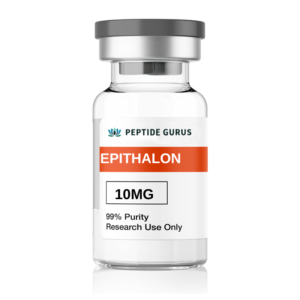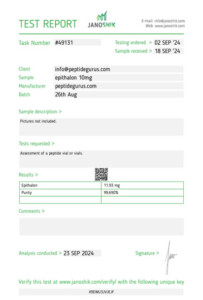In the pursuit of understanding and combating the aging process, scientific research has delved into various substances, and Epithalon has emerged as a peptide of great interest. Our Epithalon – 10mg product, with its high purity of 99%, offers a valuable resource for those engaged in anti – aging research.
Aging is a complex biological phenomenon that affects every aspect of our bodies. At the cellular level, one of the key processes associated with aging is the shortening of telomeres. Telomeres are like protective caps at the ends of chromosomes. Every time a cell divides, telomeres become shorter. Once they reach a critically short length, the cell can no longer divide properly, leading to cellular senescence or death. This cellular aging accumulates over time and contributes to the overall aging of the body, resulting in various age – related changes such as wrinkles, decreased immune function, and an increased risk of chronic diseases.
Epithalon, also known as Epitalon, is a synthetic peptide derived from Epithalamin, a natural extract from the pineal gland. Its primary mechanism of action in anti – aging research is related to telomere elongation. Epithalon has been shown to modulate the enzyme telomerase. Telomerase is responsible for adding DNA sequences to the ends of telomeres, effectively lengthening them. By activating telomerase, Epithalon may help counteract the telomere – shortening process associated with aging. This potential to extend telomeres can lead to cellular rejuvenation, allowing cells to continue functioning properly for longer periods. In theory, this could slow down the aging process at the cellular level and potentially have a positive impact on the overall health and longevity of an organism.
Beyond telomere elongation, Epithalon has shown potential in various other aspects of anti – aging. In animal studies, it has been observed to enhance the functionality of the reproductive and immune systems. For example, in some experiments with mice and rats, Epithalon treatment led to improved reproductive performance and a strengthened immune response. A better – functioning immune system is crucial for combating infections and diseases, which become more common as we age. Additionally, Epithalon may play a role in maintaining the integrity of other organ systems. It has been suggested that it can influence gene expression in a way that promotes healthy cell function and reduces age – related degeneration.
Epithalon’s role in DNA regulation is another area of interest in anti – aging research. DNA is the blueprint of our cells, and maintaining its stability and proper function is essential for healthy aging. Epithalon may help regulate the expression of certain genes involved in cell growth, repair, and protection against oxidative stress. By ensuring the stability and integrity of genetic material over time, Epithalon could contribute to its anti – aging effects. This is particularly important as DNA damage and abnormal gene expression are associated with the aging process and the development of age – related diseases such as cancer.

Our Epithalon – 10mg peptide product is synthesized with the highest standards of quality. The 99% purity ensures reliable and accurate research results. Whether researchers are conducting in – vitro experiments on cell cultures to study the effects of Epithalon on telomere length and gene expression or in – vivo studies on animal models to observe its impact on overall health and lifespan, our product provides a consistent and dependable source of Epithalon.
To maintain the integrity of our Epithalon peptide, proper storage and handling are essential. The peptide is typically provided in a lyophilized (freeze – dried) form. It should be stored at a recommended temperature, usually around – 20°C. This low – temperature storage helps to preserve the peptide’s structure and activity. When handling the peptide, researchers should follow strict laboratory protocols. This includes using sterile equipment, working in a clean environment, and avoiding any potential sources of contamination.
As of now, Epithalon is not an FDA – approved drug for anti – aging or any other indication in humans. However, the FDA has established comprehensive guidelines for the development and testing of new drugs and biologics. For researchers using our Epithalon peptide in anti – aging research, these guidelines are crucial.
The FDA requires thorough pre – clinical studies to evaluate the safety and efficacy of new substances. This includes in – vitro assays to understand the peptide’s mechanism of action, as well as in – vivo animal studies to assess its toxicity, pharmacokinetics (how the body processes the peptide), and potential therapeutic effects. If the pre – clinical results are promising, researchers may then progress to clinical trials in humans. The FDA’s review process for clinical trials is rigorous, ensuring the protection of participants’ safety and the reliability of the data collected.
No, the
Epithalon peptide available from us is intended for research purposes only. It has not been approved by the FDA for human use. Self – treating with Epithalon to slow down aging can be dangerous and is not recommended. Any treatment for anti – aging should be done under the supervision of a qualified healthcare provider using FDA – approved methods.
The time it takes for Epithalon to show anti – aging effects can vary depending on the type of research. In in – vitro cell culture studies, changes in telomere length or gene expression may be observed within a few days to weeks. However, in in – vivo animal studies, it may take longer, sometimes several months, to see significant changes in overall health and lifespan. It’s important to note that these are just general timelines, and the actual results can vary based on many factors.
In anti – aging research, the side – effect profile of Epithalon is still being studied. In animal models, some minor changes in hormonal levels have been reported in some cases. Since Epithalon affects telomerase activity and gene expression, there is a theoretical risk of abnormal cell growth, although this has not been clearly demonstrated. More research is needed to fully understand the potential side effects, especially in the context of human use.

